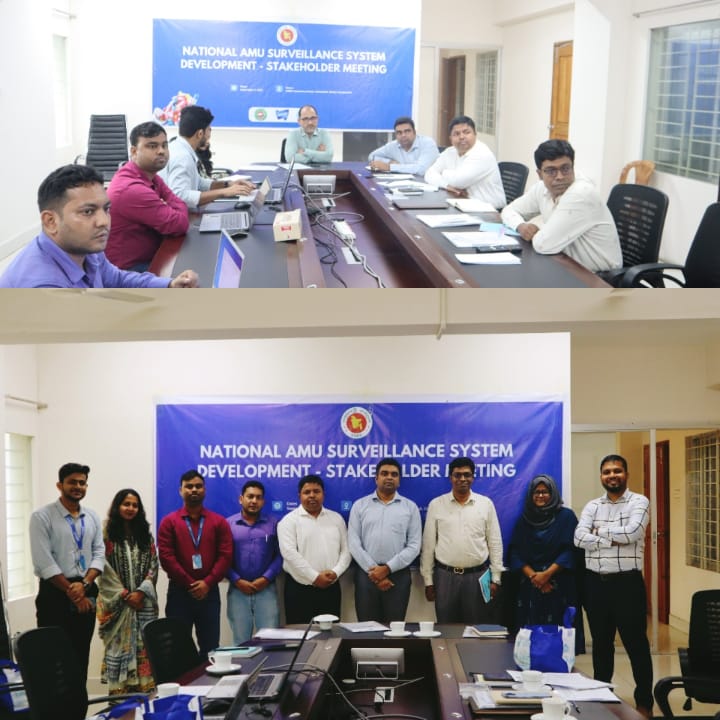The third and final stakeholder meeting on the development of the National Antimicrobial Use (AMU) Surveillance System for the Directorate General of Drug Administration (DGDA) was successfully held on September 7, 2025, with active participation from DGDA, the World Health Organization (WHO), and JBRSOFT Limited. This concluding session marked a significant milestone in the project, reflecting the strong national collaboration and collective commitment to establishing a robust AMU surveillance mechanism in Bangladesh.
Building on the progress achieved through earlier sessions, the final meeting served to review the completed system, demonstrate its core functionalities, and gather final feedback to guide deployment and operationalization.
Key Highlights: Development Progress Demonstration
The JBRSOFT team conducted a live demonstration through the dedicated demo server (https://www.demo.amusurveillance.com/). The session showcased several key updates, starting with Company Registration, which streamlines the enrollment process for participating companies. The Product Setup and Update functions by DGDA were also highlighted, enabling regulators to configure and maintain product data efficiently.
In addition, the team presented the Data Entry and Submission modules, allowing companies to input AMU data and track their submissions in real time. The Reporting tools were demonstrated to show how structured reports can support regulatory review and oversight. Finally, the Dashboard features provided a clear visualization of data trends, offering real-time insights to guide evidence-based decision-making.
Stakeholder Insights and Open Discussion
An open discussion followed the system demonstration, where participants acknowledged the visible progress and appreciated the collaborative efforts that led to the successful completion of the platform. Stakeholders provided valuable feedback on strengthening user training, refining reporting formats, and ensuring smooth workflows for data submission and approval. The discussion also emphasized the importance of ongoing support and capacity building to maximize the effectiveness of the system once fully deployed.
Next Actions:
- Incorporate basic feedback by September 15.
- The DGDA team will review the full system functionality using the provided superadmin and company access and share their final feedback.
- DGDA and JBRSOFT teams will plan the training sessions. It is agreed to organize three-day sessions, inviting one representative from each pharmaceutical company. Each batch will accommodate a maximum of 30 participants.
- During the one-day training and orientation, the JBRSOFT team will support companies in entering their product information.
- Ensure the production server is ready for training and piloting.
In summary
The final stakeholder meeting marked the successful conclusion of the development phase of Bangladesh’s National AMU Surveillance System. The completed platform stands as a significant achievement in strengthening regulatory oversight, improving data-driven decision-making, and advancing the country’s national response to antimicrobial resistance (AMR).
Special recognition goes to DGDA for their leadership, to WHO for their effortless support, and to all stakeholders for their continuous guidance and contributions throughout the development journey. With the system now ready for implementation, this collaborative effort lays the foundation for a sustainable, impactful, and nationally owned AMU surveillance mechanism.
To stay informed about our latest innovations in health systems and digital transformation, follow JBRSOFT Limited on:
🌐 Website: https://jbrsoft.com
🔵 LinkedIn: linkedin.com/company/jbrsoft
📘 Facebook: https://www.facebook.com/jbrsoft
🐦 Twitter: https://x.com/Jbrsoft10
If you are interested in a similar business case, feel free to contact us: Email: management[@]jbrsoft.com, Direct: +8801968-192627
#NationalAMUSurveillance #DGDA #WHO #JBRSOFT #StakeholderMeeting #Bangladesh #AMR #AntimicrobialResistance #Pharma #DigitalHealth #Innovation #PublicHealth #DataDriven #EvidenceBased #Regulation #Healthcare #SurveillanceSystem #Collaboration #CapacityBuilding #Training

